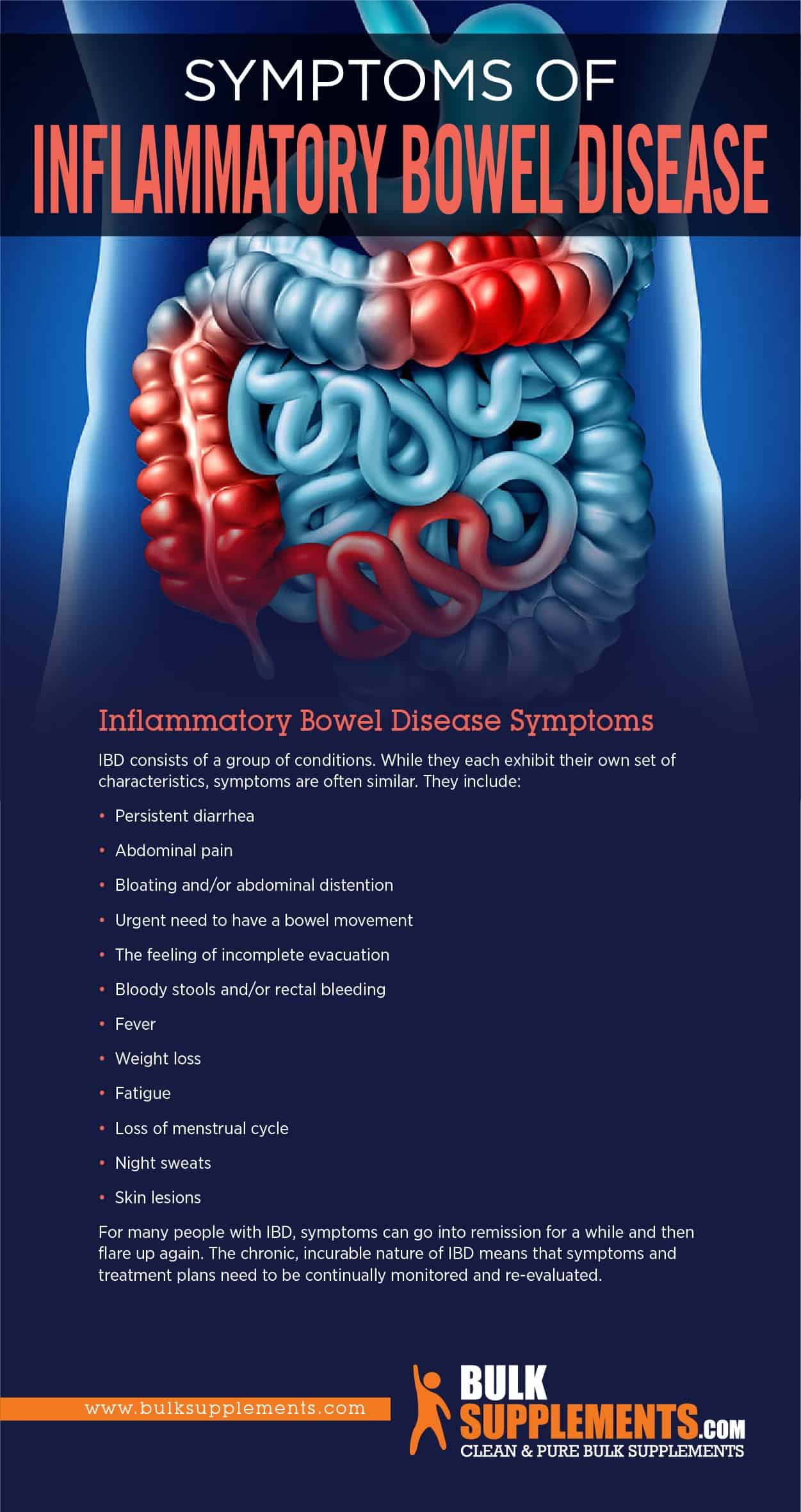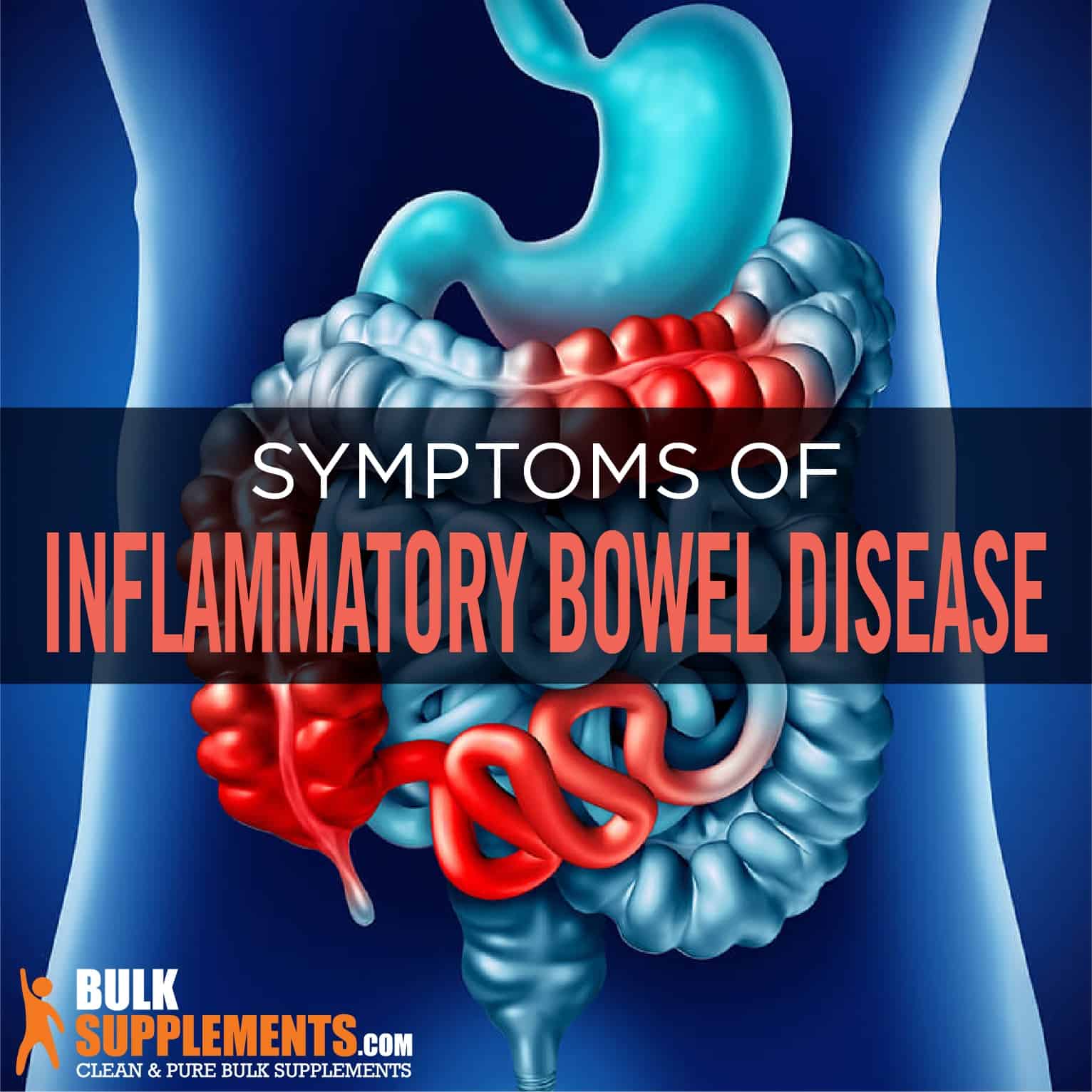What is Inflammatory Bowel Disease?
Inflammatory bowel disease, or IBD, is a term used for a group of conditions characterized by chronic inflammation of the gastrointestinal (GI) tract. The two most common types are Crohn’s disease and ulcerative colitis. These conditions can cause inflammation of your GI tract from the mouth, stomach, and intestines down to the anus. They also cause symptoms that can be painful and disruptive, such as diarrhea, weight loss and rectal bleeding. (x)
IBD results from an autoimmune response in your body. It means that the immune system attacks the body’s own healthy cells, eventually damaging organs. Here, it adversely affects the GI tract.
You might confuse IBD with irritable bowel syndrome (IBS). While symptoms may overlap between the two conditions, there is a difference, but confusion sometimes happens. With IBS, no actual damage to the GI tract happens, unlike IBD. In other words, IBS is a “functional” disease, while IBD is “structural” disease. (x)
As a chronic condition, it has no cure, but you can manage it through lifestyle habits, medication and dietary supplements.
Inflammatory Bowel Disease Symptoms
IBD consists of a group of conditions. While they each exhibit their own set of characteristics, symptoms are often similar. They include: (x) (x) (x)
- Persistent diarrhea
- Abdominal pain
- Bloating and abdominal distention
- Urgent need to have a bowel movement
- The feeling of incomplete evacuation
- Bloody stools and rectal bleeding
- Fever
- Weight loss
- Fatigue
- Loss of menstrual cycle
- Night sweats
- Skin lesions
For many people with IBD, symptoms can go into remission for a while and then flare up again. The chronic and incurable nature of IBD means that symptoms and treatment plans need continually monitoring and re-evaluation.
Inflammatory Bowel Disease Causes
Researchers are working fervently to understand what causes IBD, since these conditions are life altering and are becoming more common. (x)
So far, IBD appears to be an inappropriate response by the immune system towards cells of the GI tract, resulting in inflammation that damages the cells and organs. Sometimes there is a genetic component, meaning that if one family member has IBD or another autoimmune condition, another is more likely to develop one.
Genes alone doesn’t explain it, however. The prevailing theory is that environmental factors (originating inside your body, like hormones, and outside, like allergens or viruses) can trigger the onset of the disease or flare-ups. For those with a predisposition to IBD, triggers can include an imbalance of gut microbiota, environmental pollution, smoking, stress, use of antibiotics and even hypoxia (reduced oxygen resulting from living in high altitudes). (x)
IBD is a structural disease, so there is physical damage that causes symptoms. Chronic inflammation or swelling of the digestive tract and ulcers are detectable through x-ray, endoscopy, colonoscopy, surgery or biopsy. (x)
Inflammatory Bowel Disease Treatment
IBD is a chronic illness for which there is currently no cure. Treatment focuses on managing symptoms and inflammation that include lifestyle changes and medication. Sometimes, dietary supplements help as a part of the overall treatment plan.
Crohn’s disease and ulcerative colitis are not fatal in and of themselves, but they can lead to severe complications that may be devastating, including: (x)
- Malnutrition
- Perforated bowel — essentially a hole that develops in the intestine because of inflammation
- Arthritis and inflammation in other areas of the body
- Severe rectal bleeding and anemia
- Rapid inflammation of the colon called “toxic megacolon”
IBD Diets
Rates of IBD are going up worldwide, and no one is quite sure why, but the scientific community can all agree it’s complicated. One proposed theory involves the increasing popularity of the Western diet (high in fat, protein and inflammatory food and low in fruit and vegetables). As a result, people with IBD sometimes try to follow specific diets believed to help reduce inflammation and promote healthy gut microbes. Examples of these diets are:
- Low-fermentable oligosaccharide, disaccharide, monosaccharide and polyol (FODMAP) diet
- Paleolithic diet (Paleo)
- Specific carbohydrate diet (SCD)
- Anti-inflammatory diet (AID)
While some people find these diets improve symptoms, no rigorous studies show conclusive data at this point. (x)
Medications
If you have IBD, it’s common to need medication to control your condition. There are several types of drugs prescribed. Which medications have many factors relating to the severity of the IBD, the types of symptoms involved, and how well you respond to one treatment over another. Common types of medications include: (x)
- Aminosalicylates – The drugs can reduce inflammation for newly diagnosed patients with milder symptoms.
- Corticosteroids (steroids) – Also, these drugs can reduce inflammation but carry a risk of more severe side effects. Doctors try to prescribe these in moderate-to-severe cases and only as a short-term treatment.
- Immunomodulators – Another class of drugs that reduces the activity of the immune system and, therefore, can lower inflammation.
- Biologics – Medications that act on proteins made by the immune system, thereby neutralizing them. They can help patients go into remission from IBD.

Supplements for Inflammatory Bowel Disease
If you want to take supplements for IBD, take the time to talk to your physician about it. Some people have found relief by supplementing, and you may, too. Some recommendations include:
- Curcumin
The active ingredient in turmeric, curcumin, exerts natural anti-inflammatory effects. As a result, researchers have been testing it on IBD. Some studies show it can reduce inflammation, while others do not display this effect.
One particular study showed a minimal improvement over a placebo with recommendations to continue with more research. (x)
A more extensive, overall, study shows the therapeutic value of taking curcumin. The patients showed improvement combining the herb with other traditional anti-inflammatory medications. (x)
- Boswellia Serrata Extract
Also known as Indian Frankincense, Boswellia serrata extract can reduce inflammation and promote GI health. Research shows it may be a helpful supplement to support IBD management. Starting with low doses and working your way up will help avoid specific side effects like acid reflux, diarrhea and nausea. (x)
In a study, Boswellia proved more effective against Crohn’s disease than a common anti-inflammatory medicine. (x)
- Aloe Vera Extract
Aloe vera has anti-inflammatory effects and not only soothes the skin but can soothe the digestive tract. Studies show it might have therapeutic value for IBD by suppressing inflammatory immune cells. (x)
Like with Boswellia, however, too much aloe can cause digestive disturbances like diarrhea. Starting with a low dose might be a good idea. (x)
- Probiotics
Probiotics consist of good bacteria or their components. Several studies support taking probiotics may help play an essential part in maintaining remission of ulcerative colitis, whereas it’s not as effective with Crohn’s disease. (x)
Reportedly, animal models and humans with ulcerative colitis and pouchitis, inflammation of the pouch a common complication if you have ulcerative colitis. (x) These studies support the benefits of probiotics, live microbial food in your system for keeping ulcerative colitis in remission. (x)
- Wheat Grass
An extract from the pulp of wheatgrass and used for several treatments of different intestinal diseases, including thalassemia, blood condition, studies how its flavonoid and phenolic contents wards off antioxidant activity. It’s proven to effectively treat ulcerative colitis, showing significant reductions in patients’ disease activity. (x)
- Tormentil Extract
A member of the rose family, tormentil grows all over Europe like a wild plant. As an extract, it contains high levels of tannins, an anti-inflammatory agent. The extract is also effective against diarrhea and intestinal inflammation. In vitro research supports its antioxidant, anti-inflammatory, and bacterial growth monitoring effects. A study reports favorable treatment with ulcerative colitis patients, orally taking 1200 to 3000 mg daily for three weeks. Other factors came into the treatment program, including a four-week washout phase — patients received no treatment. All patients during the study improved but increased during the washout days. The good thing is there are no side effects. (x)
- Butyrate
Butyrate helps the gut as a four-carbon short-chain fatty acid. Depletion of microbial communities in the colon manifests in ulcerative colitis patients. Supplementing their bodies with butyrate proves fruitful with patients taking 4 grams a day combined with Mesalazine, a drug that treats IBD. Also, other non-controlled clinical trials using butyrate orally and as an enema proved just as effective. (x)
Where to Buy Supplements for Inflammatory Bowel Diseases?
You can purchase these powders and supplements for Inflammatory Bowel Diseases at BulkSupplements.com. The company is an industry-leading manufacturer and distributor of pure dietary supplements.
BulkSupplements.com is not just a consumer brand. It also supplies pure ingredients to other food and supplement brands to make their products. All products at BulkSupplements.com are manufactured and tested according to current and proper manufacturing practices.
Are you interested in trying any of these powders or supplements mentioned in this article as a possible solution to helping you with Inflammatory Bowel Diseases? Contact BulkSupplements.com to place an order today.
The Bottom Line
Inflammatory bowel diseases, including Crohn’s disease and ulcerative colitis, are chronic conditions affecting the digestive system. About 1.6 million people in the U.S. alone have IBD, but the number is rising worldwide. (x)
Symptoms of IBD can be painful and disruptive and include diarrhea, bleeding in the GI tract, weight loss and skin lesions. If not addressed, more severe complications can arise. Currently, medication is the most common and effective treatment for IBD. Special diets and dietary supplements can also contribute to the overall success of treatment.
It appears treating ulcerative colitis with supplements and herbs is beneficial with proven clinical studies. Probiotics, aloe vera gel extract and Boswellia Serrata extract seem to work positively against Crohn’s disease. Discuss taking new supplements with your physician to make sure it is a suitable choice for your body.
These statements have not been evaluated by the Food and Drug Administration. These products are not intended to diagnose, treat, cure or prevent any disease.


